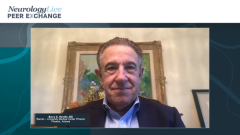
Role of High Efficacy Therapy for MS
Dr Barry A. Hendin reviews the use of high efficacy therapy in MS.
Episodes in this series

Ahmed Z. Obeidat, MD, PhD: One of the things we want to talk about is the treatment of multiple sclerosis [MS] with high efficacy therapy. Dr Hendin, I’m going to come back to you. I watched your video where you talked about MS and your practice. You talked about how there were no treatments in the 1970s, and now the treatment is so complex and we have so many options. You mentioned 20 agents at the time that you recorded the video. It’s a great insight to see that there’s a sea change in MS care. There’s major change. We have lots of options. We have highly effective therapies, and there are more data talking about the use of highly effective therapy early on in MS. What does that have as a benefit to our patients?
Also, we were discussing from a balance standpoint how using early therapy might be beneficial for efficacy. But what are some of the limitations and things that we need to be concerned about, mitigating, or watching for? I’ll start with you, Dr Hendin, regarding the use of highly effective therapy in early MS.
Barry A. Hendin, MD: In a way, the question is, are we moving rationally toward a time in which the earlier use of higher efficacy agents makes sense for clinicians and patients? I’d contend that the answer is yes. If you asked why we have made that decision over time, it’s a lot of different points. One is looking at the epidemiology or demographics of MS 30 years ago. As you pointed out, I completed my residency in the 1970s when there were no therapies. The prognosis for MS was far worse for progressive disease and disability early in the course of MS. When we developed some disease-modifying therapies, even if they were only modestly effective, they changed the outcome, and there was less disability less quickly, so preservation of function for a longer period of time.
That kind of demographics or epidemiology has continued. If you look at studies out of Canada and the United States, we’ve seen a reduction and delay of disability as we’ve moved toward more effective therapies. When they compared 2 countries in Scandinavia, and one used higher efficacy agents and the other used more traditional, lesser efficacy agents, the outcomes in the country that used higher efficacy agents earlier was better. It makes sense.
I go back to our pivotal trials. The pivotal trials now use an active comparator, so they’re comparing one agent against another. Not surprisingly, they are finding that during the 2 years of observation, the people who are treated with a higher efficacy agent do better. The bigger deal is that even when you then follow that population for years thereafter, the people who are started on lower efficacy agents don’t catch up. They maintain a degree of disability that never catches up.
In summary, the world is often divided into people who are escalators, who start with low efficacy, vs those who are high efficacy users early. But many of the clinicians and neurologists in practice say they are neither. They say, “I deal with the 1 patient in front of me. If I think that patient in front of me has a poor prognosis, I use my more effective agent. If I think that patient has a good prognosis, I use my less effective agent.” I don’t think we’re that good at prognosis. If we were wonderful at prognosis, that would be great, but we’re not. The differentiations of demographics based on gender, race, and age aren’t very good differentiators for prognosis in the individual. Some people are going to do well no matter what you do, but most won’t. Therefore, I’m perfectly willing to overtreat the few to protect the many. The case for high efficacy agents for most patients is increasingly established.
Ahmed Z. Obeidat, MD, PhD: Thank you very much. This is very informative. You talked about real-word data, your practice, and clinical trials in answering this question, which is phenomenal.
Transcript Edited for Clarity
Newsletter
Keep your finger on the pulse of neurology—subscribe to NeurologyLive for expert interviews, new data, and breakthrough treatment updates.














